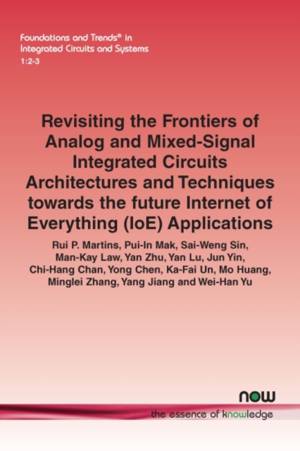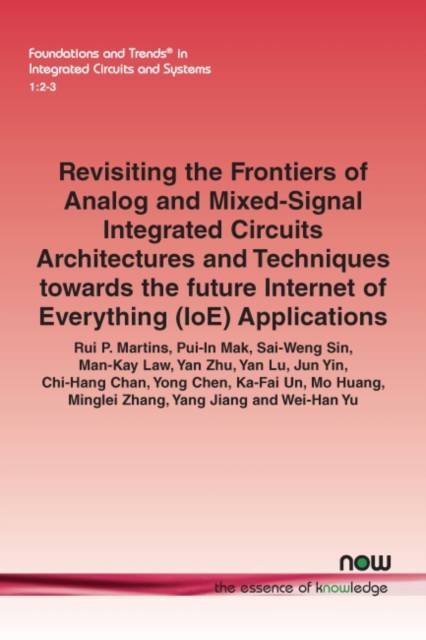
- Retrait gratuit dans votre magasin Club
- 7.000.000 titres dans notre catalogue
- Payer en toute sécurité
- Toujours un magasin près de chez vous
- Retrait gratuit dans votre magasin Club
- 7.000.0000 titres dans notre catalogue
- Payer en toute sécurité
- Toujours un magasin près de chez vous
Revisiting the Frontiers of Analog and Mixed-Signal Integrated Circuits Architectures and Techniques Towards the Future Internet of Everything (Ioe) Applications
Rui P Martins, Pui-In Mak, Sai-Weng Sin, Man-Kay Law, Yan Zhu, Yan Lu, Jun Yin, Chi-Hang Chan, Yong Chen, Ka-Fai Un, Mo Huang, Minglei Zhang, Yang Jiang, Wei-Han Yu
100,95 €
+ 201 points
Description
Technology-assisted People-to-People (P2P) interactions, embedded in a global environment, will be at the core of 21st century communications and will command the technological development of the forthcoming future. The intelligent interactivity of people, process (delivering the right information to the right person/machine at the right time), data and things, incorporates the Internet-of-Everything (IoE) that expands itself beyond the Internet-of-Things (IoT). In general, IoT comprises all physical or cyber objects (things) with an address that can transmit data (without human-to-machine interactions), while the IoE also involves communications among the users and the whole universe of electronic gadgets. Further, they both operate with data acquired from analog sources, thus connecting two different realities, the analog (physical/real) and the digital (cyber/virtual) worlds. Since the interface between the two realms deals with analog signals, its mandatory functions integrate several analog and mixed-signal sub-systems that include signal sensing, transmission and reception, frequency generation, energy harvesting, in-memory processing, data and power conversion. This publication presents state-of-the-art designs of the most critical building blocks of the analog/digital interface highlighting new and innovative circuit architectures and techniques. It addresses capacitive sensor interfaces, ultra-low-power wireless transceivers, key technologies for wireline transceivers, oscillators and frequency generators, integrated energy harvesting interfaces, in-memory processing, as well as, data and power converters, all exhibiting high quality performance with low power consumption, high energy-efficiency and high speed, thus enabling a reliable and consistent development of the IoE while enlarging its frontiers. In the coming decades, with the continuous evolution of electronics downscaling, the challenges that the above-mentioned sub-systems face will be tremendous in terms of the requirements for ultra-low power and ultra-high speed, obtained with the maximum energy-efficiency. Thus, the analog and mixed-signal very large scale integration area of work will continue to be an attractive field for research for design engineers both in the academia and in the industry, as it has been always the case since the emergence of silicon planar electronics 6 decades ago.
Spécifications
Parties prenantes
- Auteur(s) :
- Editeur:
Contenu
- Nombre de pages :
- 160
- Langue:
- Anglais
- Collection :
Caractéristiques
- EAN:
- 9781680838923
- Date de parution :
- 02-11-21
- Format:
- Livre broché
- Format numérique:
- Trade paperback (VS)
- Dimensions :
- 156 mm x 234 mm
- Poids :
- 231 g

Les avis
Nous publions uniquement les avis qui respectent les conditions requises. Consultez nos conditions pour les avis.






